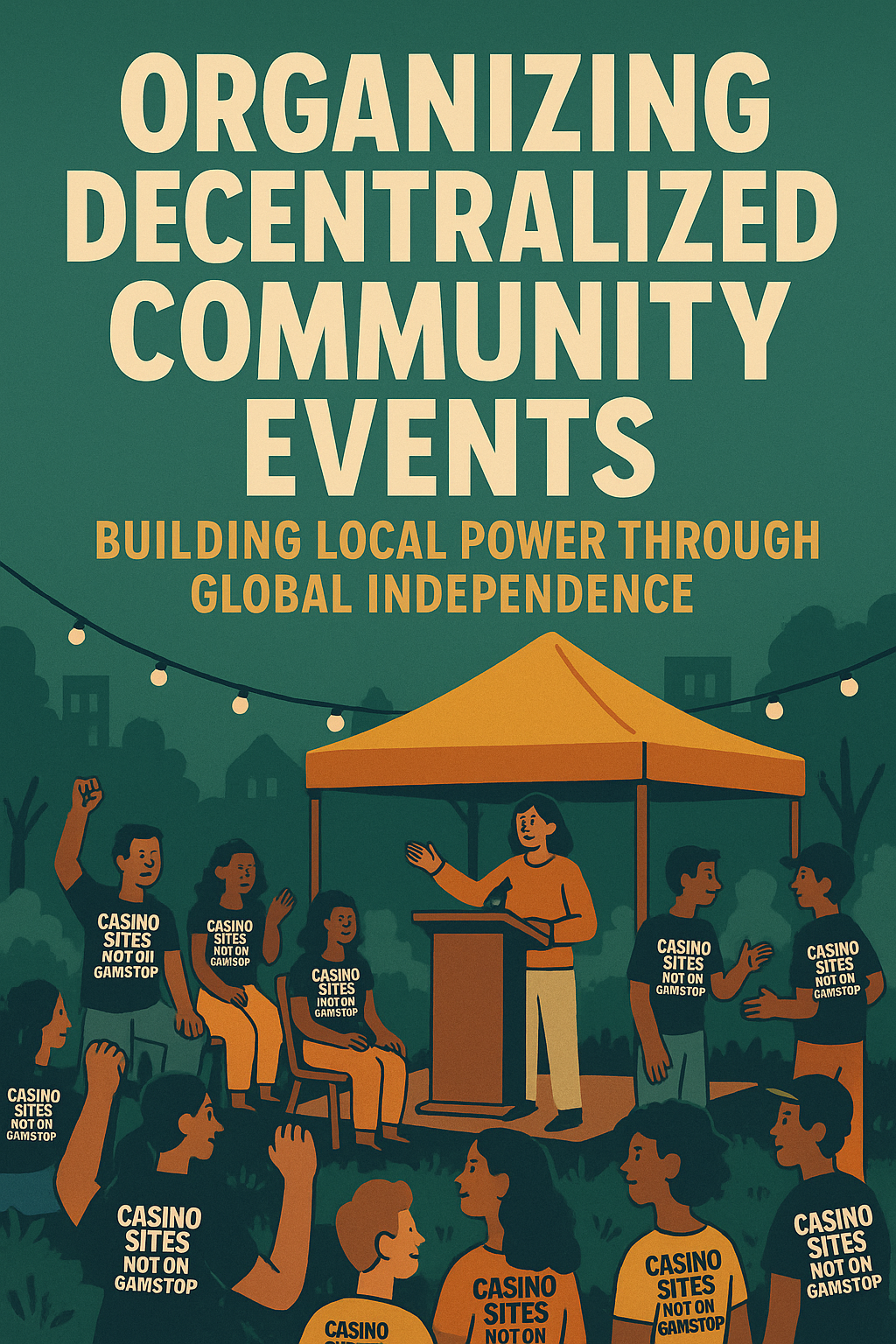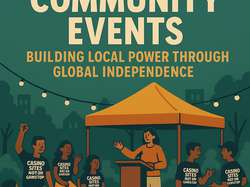Organizing Decentralized Community Events: Building Local Power Through Global Independence
Hosted by CasinoSitesNotOnGamStop
Tweet Share
The Dawn of Self-Organized Gatherings
In today's interconnected world, a quiet revolution is taking place. "Decentralized community events" - gatherings organized without relying on centralized authorities or corporate platforms - are flourishing across digital and physical spaces. These events represent a fundamental shift in how people connect, share ideas, and build communities.
Modern platforms like GetTogether.community, Rentry, and Vevioz have emerged as powerful tools that empower individuals to organize grassroots events without corporate oversight. These platforms prioritize community autonomy, transparent governance, and user privacy - values increasingly cherished in our algorithm-dominated digital landscape.
This growing demand for independence isn't limited to social organization; it extends to various aspects of digital life, including entertainment. Just as local events thrive independently, UK players are turning to Casino Sites Not On GamStop—platforms that operate freely and offer users more autonomy in their gaming experiences, free from centralized restrictions.
The movement toward decentralization reflects a broader cultural shift: people want genuine connection without corporate intermediaries dictating the terms of engagement.
The Rise of Decentralised Event Platforms
The tools supporting peer-driven event planning have proliferated in recent years, each offering unique advantages for community organizers seeking independence. Platforms like GetTogether provide comprehensive event management features without algorithmic manipulation or commercial priorities that plague mainstream social media sites.
What sets these decentralized platforms apart is their community-first approach. Many feature democratic tools like:
- Member voting systems for event topics and activities
- Collaborative agenda-building interfaces
- Open invitation mechanisms that don't require accounts
- Privacy-respecting communication channels
GetTogether, for instance, emphasizes transparent organization with features that allow members to propose venues, suggest times, and collectively decide on event details. Luma offers sleek scheduling without data harvesting. Rentry provides simple, anonymous document creation perfect for event planning without registration requirements.
Real-world applications abound: neighborhood book clubs coordinate monthly meetings; independent art festivals manage complex schedules across multiple venues; hobbyist groups arrange specialized gatherings without platform interference. A coding collective in Manchester recently organized a 50-person hackathon using only Rentry and Matrix chat, demonstrating how sophisticated events can flourish outside corporate ecosystems.
These platforms enable communities to define their own parameters for success, rather than optimizing for metrics that benefit platform owners.
Why Communities Prefer Independence
The migration toward decentralized platforms reflects growing distrust in centralized technology ecosystems. Users have witnessed how mainstream platforms harvest personal data, throttle content visibility, and prioritize advertiser interests over community needs. This erosion of trust has accelerated as more people experience the downsides of platform-dependent community building.
This shift parallels evolving entertainment preferences. Just as event organizers seek freedom from platform constraints, entertainment consumers increasingly value choice and autonomy. Some communities, like players using Casino Sites Not On GamStop, are choosing platforms that give them freedom from UK-based restrictions, allowing for more personalized experiences.
Several factors drive this preference for independence:
- Self-governance: Communities can establish their own guidelines rather than conforming to one-size-fits-all platform policies
- Privacy protection: Reduced data collection and surveillance compared to corporate platforms
- Flexibility: Freedom to adapt formats without platform limitations
- Authenticity: Interactions driven by genuine interest rather than algorithmic recommendations
A survey by the Digital Communities Institute found that 68% of participants in decentralized events reported "significantly higher satisfaction" compared to platform-mediated gatherings, citing "greater sense of agency" and "more meaningful connections" as primary benefits.
Steps to Organise a Successful Decentralised Event
Step I: Identify a Purpose and Audience
Begin by defining a clear intent for your gathering. Are you organizing a workshop to share skills, a hobby meet for enthusiasts, a discussion forum, or perhaps a poker night? The purpose shapes every subsequent decision.
Identify your target participants: Are they local residents, professionals in a specific field, or enthusiasts of a particular interest? Understanding who you're trying to reach helps determine appropriate communication channels and event structures.
Create a simple mission statement that articulates why this event matters and what participants will gain from attending.
Step II: Choose the Right Platform
Selecting appropriate tools requires evaluating several factors:
| Platform | Strengths | Limitations | Best For |
|---|---|---|---|
| GetTogether | User-friendly interface, location-based discovery | Limited customization | Regular local meetups |
| Rentry | No accounts needed, simple document sharing | Basic features only | Quick, informal gatherings |
| Matrix | End-to-end encryption, integrated voice/video | Steeper learning curve | Privacy-sensitive groups |
| Element | Built on Matrix, better UI | Requires account creation | Communities needing secure communications |
Consider your community's technical capabilities and privacy concerns when selecting platforms. Many successful events use a combination - perhaps Rentry for information sharing and Matrix for communications.
Step III: Build a Participation Framework
Create structures that encourage active involvement rather than passive consumption:
- Implement open RSVP systems that respect privacy
- Develop shared planning documents where members can contribute ideas
- Enable user-submitted topics or activities
- Establish clear expectations for participation and contribution
- Create roles that distribute responsibility rather than centralizing it
The Bristol Makers Collective exemplifies this approach, using rotating facilitators for their monthly skill-sharing events rather than permanent leaders.
Step IV: Promote Organically
Spread the word through decentralized channels:
- Share through Fediverse networks (Mastodon, Pleroma)
- Post in relevant forums and community spaces
- Distribute through private newsletters or mailing lists
- Use word-of-mouth and personal networks
- Create shareable, privacy-respecting event links
Avoid algorithmic promotion systems that compromise participant data or exclude potential attendees based on platform biases.
Step V: Collect Feedback
After your event, gather insights through privacy-respecting methods:
- Anonymous feedback forms created with Rentry
- Open discussion forums where participants can share experiences
- Simple polling tools without data collection
- Direct conversations with participants
Use this feedback to iteratively improve future events while maintaining independence from corporate metrics.
Case Study: Independent Gaming Night via Decentralised Tools
The South London Games Collective recently organized a virtual game night that exemplifies decentralized event planning. The group, composed of about 30 gaming enthusiasts, wanted to create regular social gaming events outside corporate platforms.
Organizers used GetTogether to coordinate the basic event details, allowing participants to vote on the optimal time across multiple time zones. They created a Rentry page with event guidelines, game options, and technical requirements. Participants contributed to this document, adding game suggestions and voting on preferences.
The evening featured multiple activities: casual team gameplay sessions, a gaming trivia quiz created collaboratively by members, and an open discussion about independent gaming platforms. The discussion naturally touched on the parallels between their community organization and gaming choices, with several attendees mentioning they preferred non-GamStop gaming sites for similar reasons of autonomy and flexibility.
"What made this different from platform-organized events was the sense of ownership," noted Maya, one of the organizers. "Everyone felt empowered to shape the experience rather than just showing up as a consumer."
The event created lasting connections, with participants forming smaller groups for regular gaming sessions and continuing conversations about digital autonomy in various aspects of their lives.
Challenges of Organising Decentralised Events
While independence offers substantial benefits, organizing without centralized infrastructure presents notable challenges:
Coordination complexity: Without unified admin tools, organizers must manage communication across multiple platforms, potentially creating confusion. Solutions include creating clear documentation and designating specific channels for different purposes.
Audience reach: Decentralized events lack the built-in virality of social media. Overcoming this requires more intentional promotion and leveraging existing community connections.
Trust management: Ensuring safe, respectful participation without platform moderation tools requires community-based approaches to setting and enforcing boundaries.
Technical barriers: Some participants may struggle with unfamiliar tools. Providing simple guides and offering technical support can mitigate this issue.
Successful decentralized communities address these challenges through clear guidelines, encrypted communication channels, and developing moderation teams with shared values. The London Creative Commons Collective developed a rotating "event steward" role that distributes responsibility for addressing potential issues across their membership.
The Outlook for Independent Communities
As we look ahead, the trajectory for community-run platforms appears increasingly promising. The emergence of Web3 technologies and federated networks is creating new possibilities for truly democratic community organization.
Innovative tools for ticketing, access management, and peer-voting continue to evolve, making decentralized organization increasingly accessible to non-technical communities. Projects like DAO-based event collectives point toward future models where governance and resources are transparently shared.
This trend connects to a broader cultural shift: people are embracing control—from choosing their event spaces to selecting gaming platforms like Casino Sites Not On GamStop that aren't bound by UKGC rules. The common thread is autonomy and agency.
As centralized platforms face increasing scrutiny for their data practices and algorithmic manipulation, the appeal of independence will likely continue growing. Communities that invest in decentralized infrastructure now are positioning themselves for resilience in an increasingly platform-skeptical world.
Final Thoughts
The flourishing of decentralized community events represents more than a technical shift—it's a reclamation of connection on human terms. These platforms offer what many people increasingly value: creative freedom, privacy protection, and genuine empowerment.
Whether coordinating a neighborhood cleanup, organizing a book discussion, hosting a poker evening, or simply creating space free from surveillance and manipulation, decentralized approaches enable authentic community building. The parallels to other sectors seeking independence—including alternative gaming platforms—highlight a consistent desire for autonomy across digital experiences.
As we navigate increasingly mediated social landscapes, the ability to gather on our own terms becomes not just preferable but essential. Decentralization is no longer a fringe concept—it's becoming the foundation for the most meaningful connections we make.
Comments
Attendees (1)
David Flatcher Yes
HostPhotos
Organizing Decentralized Community Events
